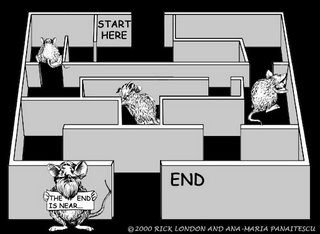
Last night I watched a Canadian news special about the events leading up to 9/11, preferring an outsiders view to anything I might find within our boarders. The show did a marvelous job detailing much of the history surrounding various terror networks, Osama, Taliban, Al-Qaeda, and much more. What I found most interesting was the highlighting of different leadership styles between Bill Clinton and George Bush. It appears that several times the Clinton administration had the chance to either arrest or eliminate both Osama and other high level known terrorist leaders, but each time, at the last second, the operation would be cancelled. Either there was a fear of collateral damage, or a fear of failure. Clinton appeared to be that type of leader who would forever gather more information without ever committing to a course of action, fearful as he was of making the wrong decision.
On the other hand, George Bush, it appeared (and continues to appear), had gathered around him a host of counselors who, in the wake of 9/11 articulated a plan to dismantle Saddam’s dictatorship in Iraq. Richard Clarke, Colin Powell, and a host of other high ranking military and defense officials all made it clear that such pursuit was irrelevant to the terrorist effort. But Bush, unlike Clinton, would not be dissuaded from his course of action with more information. The results, at least in the moment, speak for themselves.
Don’t miss the point for the story. I’m not really pondering the validity of the war effort this morning, though it’s certainly a point worth considering. I’m pondering the two different leadership styles of our most recent presidents: The former, generally speaking, lacked capacity to pull the trigger and make a decision when one was needed – and the result is that we’re all paying a price. The latter seems to dismiss all counselors who don’t agree with his view of the world, and forge ahead, sometimes in denial of harsh realities. Is there a third option?
Richard Clarke, a high level intelligence official in both the Clinton and Bush era’s, was frustrated by Clinton’s lack of decisive leadership. When Bush took office, Clarke sent him a memo saying that the two of them needed to talk about terrorism and Al-Qaeda. The meeting didn’t take place until after 9/11. Clarke, not in Bush’s inner circle, was ignored. And it was Clarke, who was involved on the watch of both leaders, who had the guts to say to the American people, “Our intelligence systems have failed you. Our government has failed. I have failed you.”
Knowing when to listen and ponder and when to act, it seems, are critical components of healthy leadership. Every leader I know tends towards one side or the other of this critical balancing act. The events of 9/11 and beyond show us that failure to hold these qualities in proper balance can be fatal.





